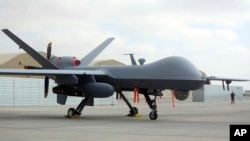American counterterrorism airstrikes in northern Afghanistan are reported to have killed up to 35 Islamic State militants and wounded a dozen more.
A regional Afghan military statement said Saturday the pre-dawn strikes took place in the Darzab and Qishtepa districts of Jowzjan province, where IS maintains bases.
The statement noted that seven nationals of the neighboring Central Asian nation of Uzbekistan also were among the dead.
The army said, using the Arabic acronym for IS, American special forces also conducted a ground raid in Qishtepa and captured “a key Daesh commander” along with several other aides.
The airstrikes came a day after a pro-Islamic State group launched a social media campaign promoting jihadi mobilization to the Afghanistan-Pakistan region. The group, al-Qastantiyyah (Constantinople) Foundation, posted the announcement on its Telegram channel Friday, according to the SITE Intelligence Group, which monitors jihadist threat alerts.
The message, it said, appeared to make an implicit reference to a recent video from IS’ Afghan branch, which called for migration to Jowzjan and eastern Nangarhar province of Afghanistan.
The Middle East-based terrorist group began its extremist operation in the war-hit country about three years ago after establishing bases in several of Nangarhar’s southern districts.
American commanders, however, insist sustained operations in partnership with Afghan ground forces have killed hundreds of IS loyalists, including leadership-level commanders, and significantly reduced the group’s territorial control.
The Taliban also has been attacking IS militants in Afghan areas controlled or contested by the insurgency.
Local media reported Saturday the latest clashes between the two rival groups also took place in Jowzjan, killing more than 13 IS militants.
Authorities in neighboring Pakistan say Daesh bases in Afghan border regions are being used to plot terrorism against the country.
The growing influence of IS also has raised alarms in neighboring Iran and Russia.
Moscow feels threatened by the terrorist group’s growing influence in Afghan provinces, which could undermine security of its allied Central Asian states and beyond.




